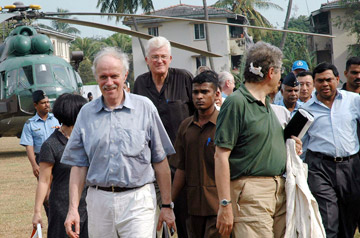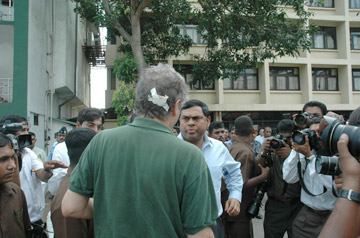|
Court ruling stressed annulments based on procedure:
EU classification of LTTE as a terrorist group stands
By Manjula Fernando
 |
|
Italian Ambassador Pio
Mariani and US Ambassador Robert Blake were injured when the
LTTE shelled a town in Batticaloa when a team of Colombo based
Ambassadors visited the region on February 27, 2007 . Here the
Italian ambassador with an injury on the back of his head. |
The recent ruling by the EU Court that lifting sanctions of certain
restrictions imposed on the LTTE as a terrorist organisation within the
regional block provided the break the Opposition was waiting and longed
for to desecrate the Government.
The ruling is to become effective in less than three months, if
poorly contested.
Among the allegations it levelled against the Government is as to why
Sri Lanka did not make it a party to the case before the EU court, when
the LTTE took action in 2011 to seek an annulment of the EU listing and
restrictions.
The EU formally termed the LTTE as a terrorist organisation on May
29, 2006. As a result the LTTE lost control of all its economic assets
in the then 25 member EU, suffering the biggest blow to their financial
strength thus contributing to diminish their military capacity resulting
in the conclusion of military operations at amazing speed.
In a press release dated May 31, 2006 issued by the European Council
in Brussels, the action taken against the LTTE was described. The first
part of the press release reads,
"1. The Council of the European Union (EU) decided on 29 May 2006 to
include the LTTE (Liberation Tigers of Tamil Eelam) on the EU list for
the application of specific measures to combat terrorism. This list
contains the names of persons, groups and entities against whom, for
reasons of their involvement in terrorist acts, specific restrictive
measures have to be taken, including:
- The freezing of funds and other financial assets or economic
resources of the persons and entities specified,
- A ban on the provision of funds, financial assets and economic
resources, and a ban on the provision of financial or other related
services, directly or indirectly, for the benefit of these persons,
groups and entities,
- Police and judicial cooperation between EU Member States.
2. The decision of the EU to list the LTTE should come as a surprise
to nobody. Several warnings have already been provided to the LTTE,
which the LTTE has systematically ignored. In its statement of 27
September 2005 (12669/1/05) the EU stated that "it was actively
considering the formal listing of LTTE as a terrorist organisation".
The EU then called upon all parties to show commitment and
responsibility towards the peace process and to refrain from actions
that could endanger a peaceful resolution and political settlement of
the conflict. Unfortunately, this appeal has gone unheeded.
The decision of the EU to list the LTTE is based on the actions of
that organisation.
 The EU still sees a need for the LTTE to amend its violent course and
return to peace talks, and will maintain its dialogue with the LTTE
where such contacts, in the pursuit of the peace process, may help to
bring about a return to negotiations and an end to violence. Listing the
LTTE will not diminish the EU's determination to play its role as one of
the Tokyo co-chairs (Japan, Norway, the US and the EU). The EU still sees a need for the LTTE to amend its violent course and
return to peace talks, and will maintain its dialogue with the LTTE
where such contacts, in the pursuit of the peace process, may help to
bring about a return to negotiations and an end to violence. Listing the
LTTE will not diminish the EU's determination to play its role as one of
the Tokyo co-chairs (Japan, Norway, the US and the EU).
The EU stresses that its decision is directed at the LTTE, and not at
the Tamil people."
In the press release, the European Council also urged the Government
of Sri Lanka for restraint and to curb violence in areas outside the
LTTE control.
The Opposiiton has offered the explanation that Sri Lanka did not
effectively obstruct the lifting of the ban because the Government was
now eyeing LTTE funds in EU soil and also because it was conniving with
the terror outfit's dormant leaders in exile.
The Geneva gate is their latest theory.
The question of Sri Lanka refraining from becoming a party to the
case was asked not without the knowledge that if Sri Lanka did just
that, we would be subjecting the country to the jurisdiction of a
foreign Court, in turn compromising its sovereignty.
Besides, being a non member state of the European Union, Sri Lanka
must fulfilll special conditions which are contrary to its interests, if
it was to be allowed to intervene as a direct party before the EU Court.
And the appeal will also be submitted for observations by the parties to
the case.
The intention of these politically motivated allegations, is to get
maximum mileage from the opportunity at hand and not safeguard the
interests of the country or its people, an independent observer said.
External Affairs Minister Prof. G.L. Peiris said if Sri Lanka wanted
to be a direct party to the case, the Government has to make a special
appeal to the General Court of the European Union. The LTTE filed two
cases against the European Council in 2011 to get them a clear bill of
record and unfreeze their assets. The UK and the Netherlands, both
members of the EU are supporting the case against the LTTE.
"We will not subject our country to the jurisdiction of a foreign
court of law. This is a fundamental principle of our foreign policy. We
have always upheld this policy and if we presented ourselves before the
EU court to contest the case, it would have been a clear violation of
this principal. The action will have grave implications to the country."
Instead Sri Lanka has submitted information and necessary documents
to the Council and hired legal experts from Brussels to get advice as to
how sensible it is for Sri Lanka to get involved, jeopardizing its
diplomatic immunity.
The Minister said he met Ambassadors of 17 EU member states based in
Colombo, within 24 hours of the Court ruling and discussed what action
to be taken in the future as well as alternative action to curb LTTE
activities in the EU.
A foreign Ministry spokesperson said the Sri Lankan Government is
currently compiling yet another dossier containing material to be used
against the LTTE in case the EU planned to bring in additional
restrictions against the LTTE.
It can be done simultaneously with the appeal. The appeal has to be
filed by parties to the case and Sri Lanka being a non party cannot take
part in the appeal.
The parties have to rectify the procedural errors that resulted in
the verdict by the General Court of the EU. This appeal will be based on
legal arguments. "We have provided information and we will continue to
provide such information to the European Council to keep the LTTE under
the radar and out of action."
The Sri Lankan Heads of Mission based in European member states have
already briefed their Capitals with some in the process of meeting them
in regards to the Court ruling.
The spokesperson said it was mere political harangue to say that the
Government was sitting on the outcome of the EU Court case.
"We have already approached the EU members seeking an appeal and some
countries have already responded to our concerns," the spokesperson
said.
The leaders in exile of the banned outfit, following the judgment,
have begun celebrating. A mega show of strength is planned in London on
November 27 heroes day to welcome the outcome of the EU case.
This is despite the Court ruling that stressed, with bold letters,
those annulments were based on fundamental procedural grounds and it
does not imply 'any substantive assessment of the question of the
classification of the LTTE as a terrorist group'.
Meaning, the Court submits that a substantive assessment is needed to
annul the classification of the LTTE as a banned terrorist organisation
and the annulment that was announced on October 16, 2014 by the EU Court
is in relation to LTTE's placement on the list of frozen funds of
terrorist organisations. |

